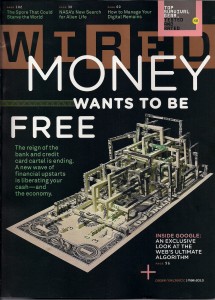News Release: The $100 Billion Question –
Speech By Andrew Haldane

Time.com March 18, 2010
To Battle Computer Hackers, The Pentagon Trains Its Own
By Mark Thompson, Washington
“More than 100 foreign intelligence organizations are trying to hack into U.S. systems,” Deputy Defense Secretary William Lynn warned last month. “Some governments already have the capacity to disrupt elements of the U.S. information infrastructure.” So the Pentagon recently modified its regulations to allow military computer experts to be trained in computer hacking, gaining designation as “certified ethical hackers.” They'll join more than 20,000 such good-guy hackers around the world who have earned that recognition since 2003 from the private International Council of E-Commerce Consultants (also known as the EC-Council).

The Tobin tax or Wall Street sales tax is rapidly gathering momentum thanks to a bid by British Labour Party MPs to save themselves from looming defeat at the hands of the Tories by playing this great economic populist card. If the Labour Party succeeds with this gambit, it will tend to transform the situation in the US as well, with desperate Democrats embracing the Tobin tax as a means of getting some populist credibility. The Republicans, by contrast, will be forced to line up in defense of their Wall Street backers, stripping away all their Tea Party camouflage. Obama-Summers-Geithner will also be put into a bind. I have been campaigning for the Tobin tax for a number of years, and it is an idea whose time has come.
If a sales tax on financial transactions (Tobin tax, trading tax, securities transfer tax, Robin Hood tax) can bring the British Labour Party back from the dead, it can defeat Geithner, Summers, Bernanke, Wall Street, and the reactionary Republicans here in the US. It is time to make this a world-wide campaign to force the bankers to pay for the world economic depression they have created.
Webster Tarpley

A tiny tax on bankers that would give billions to tackle poverty and climate change, here and abroad.
This tax on banks – not you or I – has the power to raise hundreds of billions every year. It could give a vital boost to the NHS, our schools, and the fight against child poverty in the UK – as well as tackling poverty and climate change around the world.
Not complicated. Just brilliant.
Phi Beta Iota: We support the elimination of the Federal income tax as being unconstitutional in the Unted STATES of America. Individuals should pay taxes to localities; businesses should pay taxes to all states where they do business; and federal operations should be based on the Tobin tax and strictly limited to the narrow administrative services of common concern that are consistently authorized and approved by Congress acting on behalf of the STATES.

Why Exactly Are Big Banks Bad?
By Simon Johnson, Baseline Scenario, 4 March 2010
Just over 100 years ago, as the nineteenth century drew to a close, big business in America was synonymous with productivity, quality, and success. “Economies of scale” meant that big railroads and big oil companies could move cargo and supply energy cheaper than their smaller competitors and, consequently, became even larger.
But there also proved to be a dark side to size and in the first decade of the 20th century mainstream opinion turned sharply against big business for three reasons. [Click on headline for complete original post.]
Phi Beta Iota: The earlier literature represented by Small is Beautiful and Human Scale has now been dramatically reinforced by literatures on civilization building, collective intelligence, common wealth, and so on (other lists). They all boil down to keeping power at the lowest level possible. Aggregated power is bad for democracy–this applies to big government just as it does to big banks, and it applies especially to the ludicrous notions of world government (as opposed to a world brain, where every node is unique and independent).

Webster G. Tarpley
March 3, 2010
It has been evident for some time that the ongoing speculative attack on Greece, along with such other countries as Spain, Ireland, Portugal, and Italy, was not primarily a reflection of their economic fundamentals, nor yet a spontaneous movement of “the market,” but rather an orchestrated action of economic warfare.
Full Story Online , , , TV Clip (Russia TV)
Phi Beta Iota: There is no question but that Dr. Tarpley is correct at the moment, the hedge funds are waging economic war on Europe, are out of control, and need to be stomped down. HOWEVER, what is not evident in his longer report is the fact that Europe welcomed help from Goldman Sachs and others in concealing its long-term debt, and it is for this reason that the hedge funds now have an “information advantage” that gives them a “sure bet” against the Euro generally and Greece specifically. Until the United Nations (UN), the European Union (EU), the African Union (AU), the Union of South American Nations (UNASUR), and the Shanghai Cooperation Organisation (SCO)–to name just a few–get a grip on the totality of the information relevant to their safety, security, and efficiency, predatory capitalism, virtual colonialism, and unilateral militarism will continue to rule. Our new book, INTELLIGENCE for EARTH: Clarity, Diversity, Integrity, & Sustainability, provides a game plan for creating a prosperous world at peace by arming the UN, EU, AU, UNASUR, and SCO with the means to do multicultural, multifunctional information-sharing and sense-making. Our favorite line from the book: a woman with a cell phone is vastly more powerful than a man with a gun.

We stopped subscribing to WIRED when advertising crossed the 60% mark, but this issue came to us and has a useful article on the end of old money, which is to say, the end of money where banks and credit cards take an undeserved cut from every transaction while taking huge risks with your money as collateral.
The Open Money movement is proceeding apace, with community-oriented credit cards like Interra, new forms of home rule stripping corporations of their illegitimate “personality” status, and moving money from Wall Street to the local bank.
Meanwhile, Twitter is changing the world again by becoming a trusted point to point money transfer agent. here are five new ways to pay that cut out the banks and credit card organized legalized crime lords:
Twitpay. Type a friend's Twitter handle, a dollar amount, and twitpay to transfer funds to their PayPal account.
Zong. Instead of entering credit card information anew for every online purchase, users fill in their phone number and the charge shows up on their monthly bill.
Square. The latest from Twitter cofounder Jack Dorsey, this 3/4 inch cube turns any iPhone into a credit card reader.
GetGiving. This mobile app uses PayPal to enable charities to accept small donations without the usual exorbitant credit card transactions fees.
Hub Culture. Travelers can avoid the hassle and fees of swapping dollars for euros by transacting in vritual currency in this international network of workstations.
To our surprise, PayPal itself, central to most alternative schemes, was not highlighted other than being mentioned above.

Goldman Goes Rogue – Special European Audit To Follow
Simon Johnson Baseline Scenario February 14, 2009
We now learn – from Der Spiegel last week and today’s NYT – that Goldman Sachs has not only helped or encouraged some European governments to hide a large part of their debts, but it also endeavored to do so for Greece as recently as last November. These actions are fundamentally destabilizing to the global financial system, as they undermine: the eurozone area; all attempts to bring greater transparency to government accounting; and the most basic principles that underlie well-functioning markets. When the data are all lies, the outcomes are all bad – see the subprime mortgage crisis for further detail.
A single rogue trader can bring down a bank – remember the case of Barings. But a single rogue bank can bring down the world’s financial system.
Goldman will dismiss this as “business as usual” and, to be sure, a few phone calls around Washington will help ensure that Goldman’s primary supervisor – now the Fed – looks the other way.
But the affair is now out of Ben Bernanke’s hands, and quite far from people who are easily swayed by the White House. It goes immediately to the European Commission, which has jurisdiction over eurozone budget issues. Faced with enormous pressure from those eurozone countries now on the hook for saving Greece, the Commission will surely launch a special audit of Goldman and all its European clients.
Phi Beta Iota: The balance of the above article is a “must read.”